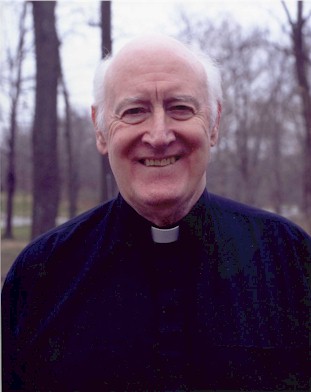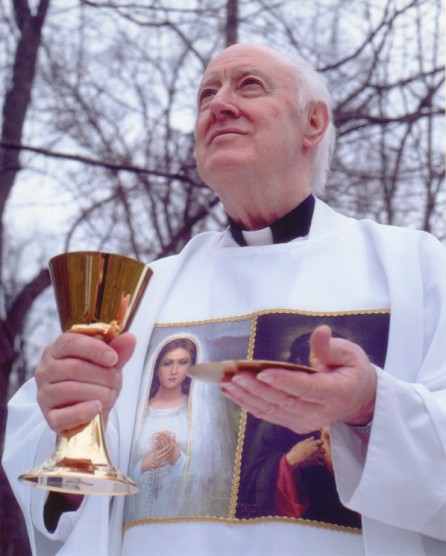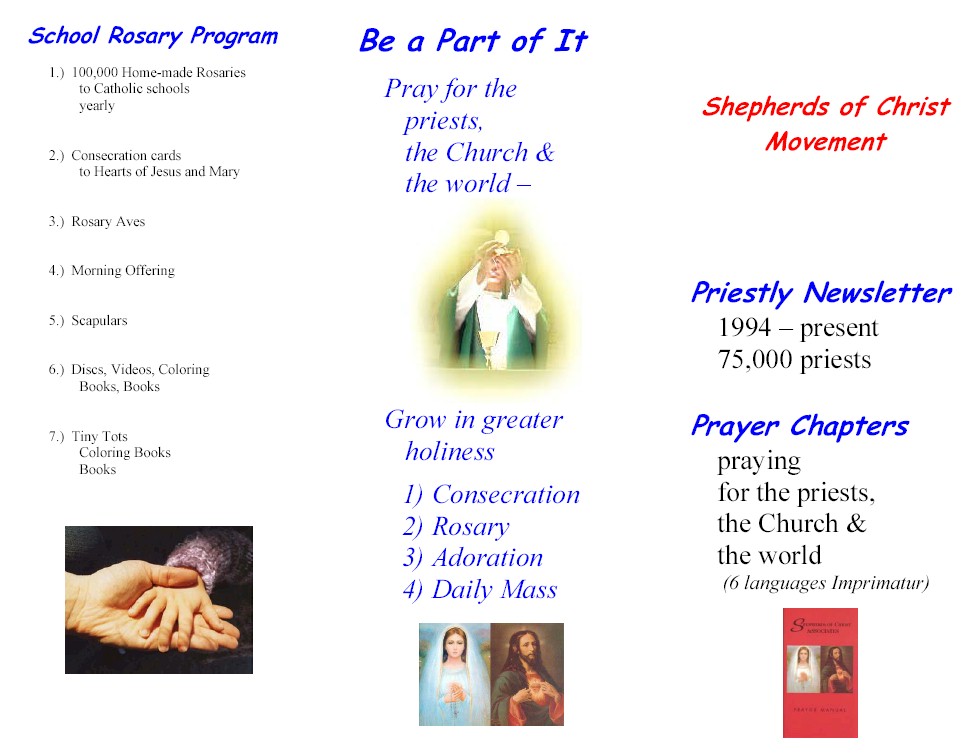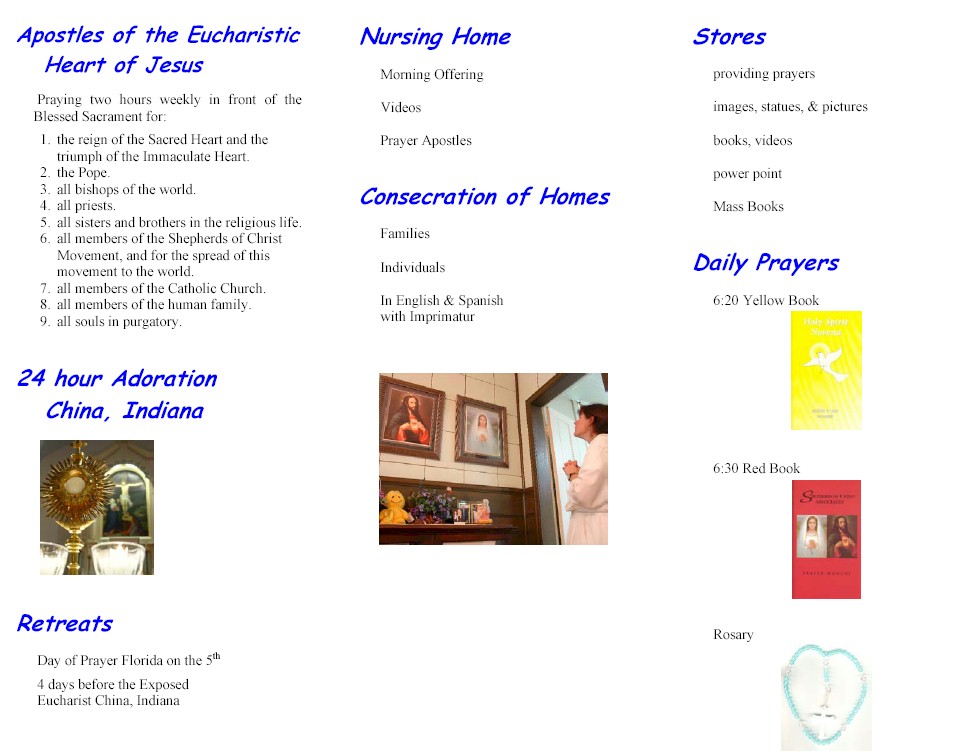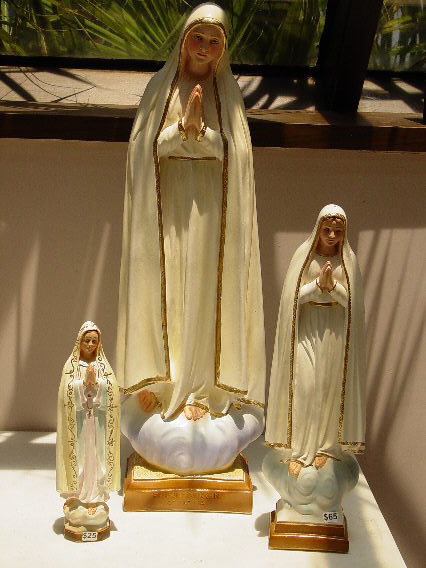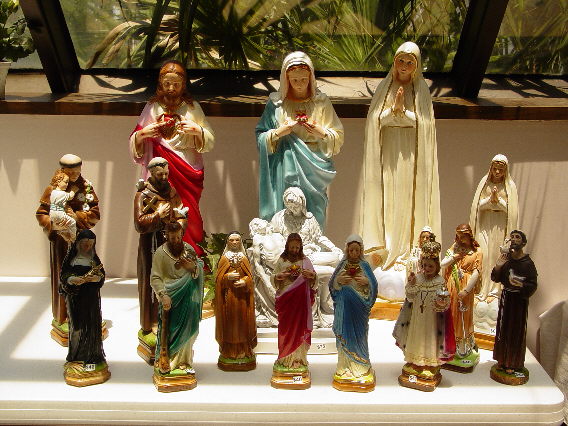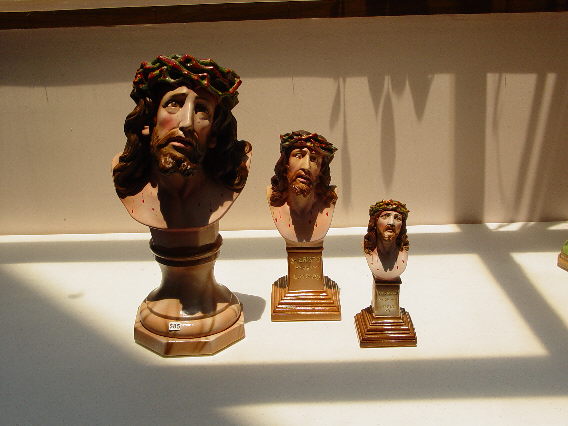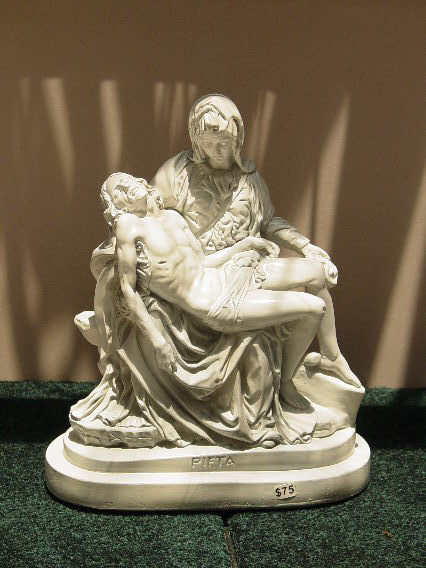I am the good shepherd: the good shepherd
is one who lays down his life for his sheep. The hired man, since he is
not the shepherd and the sheep do not belong to him, abandons the sheep
and runs away as soon as he sees a wolf coming, and then the wolf
attacks and scatters the sheep; this is because he is only a hired man
and has no concern for the sheep. I am the good shepherd; I know my own
and my own know me, just as the Father knows me and I know the Father;
and I lay down my life for my sheep.
(Jn 10:11-151)
The Son of God be-came man for our salvation. Yes, He
became incarnate. He took to Himself a real human nature. Because Jesus
possessed a real human nature, He could die for us. As the Good
Shepherd, He has laid down His life for us, His sheep.
There are many thoughts which come to us when we
reflect upon the truth that the Son of God took to Himself a human
nature and dwelt among us. Some of these are as follows:
- The Word Was Made Flesh. St. John puts it very
simply in his Gospel: "The Word was made flesh, he lived among
us..." (Jn 1:14). Yes, John states it so succinctly, yet these few
words contain a wealth of meaning and mystery. We should expect
nothing else, since this brief statement of the fourth Gospel points
out the central event of all human history. These words sum up God's
creative and redemptive activity. They sum up God's process of
Self-communication to us. Let us briefly examine some of the
implications of the Son of God becoming man.
Adequately to explain the intimacy of the way of redemption which is
the Incarnation is beyond the human powers of articulation. Jesus is
Emmanuel-God with us. How tremendously more approachable God is to
us because we have Jesus. The more the mind dwells on the meaning of
the Incarnation, the more one is stricken with wonder at this
unfathomable mystery of love. And yet, for one reason or the other,
we are tempted to allow the mystery of the Son becoming man to be a
fact we take for granted. Our sense of appreciation becomes dulled,
and our feeling of enthusiasm about Jesus becomes so tragically
mediocre. If our enthusiasm concerning Jesus is less than it should
be, what are the reasons? We are speaking of a deep-rooted
penetrating kind of enthusiasm centered in our graced wills.
Some-times this enthusiasm has deep emotional overtones. If properly
controlled, this enthusiasm involving the human emotions can be a
tremendous asset in one's commitment to Jesus. But we just do not
have it within our power to turn the emotions on whenever we wish.
The more fundamental enthusiasm for Jesus which is rooted in the
human will can and should always be substantially with us.
- Realizing Jesus' Love for Us. One reason our
commitment to Jesus can lose its ardor is that the realization of
how much Jesus loves each of us becomes a kind of peripheral or
notional assent. We intellectually assent to the fact that Jesus
loves us, but at times such an assent does not have much more effect
on our lives than admitting that Caesar crossed the Rubicon.
We are meant to assent with our entire being to the fact that Jesus
loves each of us so uniquely, so intimately, so unreservedly. This
truth of Jesus' love for us is supposed to transform our lives. It
is supposed to so grip our imagination so that we can say in the
spirit of St. Paul: "For I am certain of this: neither death nor
life, no angel, no prince, nothing that exists, nothing still to
come, not any power, or height or depth, nor any created thing, can
ever come between us and the love of God made visible in Christ
Jesus our Lord." (Rm 8:38-39)
Giving ourselves over to Jesus' love does not remove pain and
suffering from life. But, through the prism of Jesus' love for us,
suffering is seen in proper perspective. We see the pain and
suffering as being able to lead to something greater, just as it did
in Jesus' life. His suffering led to resurrection. We realize that
if we relate to suffering properly, we become persons with a
deepened capacity to love God and man - persons sharing more fully
in Jesus' resurrection. With such an attitude, this pain dimension
of life can at times become hardly noticeable because we are so
taken up with Jesus and His cause.
- The Cause of Christ. What is this cause? Some two
thousand years ago Jesus walked this earth preaching His Father's
message, healing the sick, forgiving sins, extending His kindness
and mercy, training the apostles. In all His varied activity, Jesus
was accomplishing the redemption. Today, Jesus still walks the
earth. He teaches the Father's truth. He is concerned with the sick
and the ignorant. He administers the sacraments. He manifests the
Father's love in many different ways. But, unlike that time of two
thousand years ago, Christ Himself is not visible. He is visible
only through us, His members. He extends to us the great
privilege-and responsibility-of assisting Him in the continuation of
His redemptive work. The total Christian community and each
individual Christian are, then, certain extensions and continuations
of the Incarnation. So close is this union between the Christian and
Christ that St. Paul speaks very strikingly that it is more Christ
than Paul who now lives: "I have been crucified with Christ, and I
live now not with my own life but with the life of Christ who lives
in me. The life I now live in this body I live in faith: faith in
the Son of God who loved me and who sacrificed himself for my sake."
(Ga 2:19-20)
Each of us has the privilege of offering Jesus his or her own unique
person, one's own humanity, one's own human existence. As with St.
Paul we are asked to allow Jesus to live within us. Each Christian
has the opportunity to allow Jesus to live through the uniqueness
which is this particular Christian. To the extent the Christian does
offer himself to Jesus in this manner, to that extent Jesus has a
unique opportunity of continuing His redemptive work. To the extent
the Christian holds back and does not allow Jesus to live in
oneself, to that degree Jesus loses this unrepeatable opportunity.
- Historical and Cultural Awareness. If we are to
carry forth the salvific mission of Jesus properly, the People of
God, individually and collectively, must be aware of the
Incarnation's principle of historical and cultural awareness. Jesus,
through His enfleshment, became situated within an historical
situation. He lived at a particular stage of history, in a
particular geographical locale, amid a particular kind of culture.
Jesus respected this historical conditioning. Without compromising
His Father's message, Jesus was aware of His historical milieu. He
lived like a good Jewish man of the time. He talked in language
which respected the linguistic idiom and thought patterns of the
then existent Jewish culture. He accepted the Jewish people as
conditioned by a certain historical and cultural milieu, and dealt
with them accordingly.
The members of the Christian community must follow the example of
Jesus. In living and proclaiming the Gospel message, the People of
God must be aware of the particular historical and cultural milieu
in which they find themselves. But, also after the example of Jesus,
they must strive for this awareness without compromising the Gospel.
We immediately see that the Christian community is consequently open
to a double danger. On the one hand, there is the danger that the
People of God will not read the signs of the times properly. On the
other hand, in the effort to be aware of their historical setting
there is the danger of compromising the Gospel message. But the
Christian community has to face these dangers and not surrender to
them.
- The Temporal Order. Another truth connected with
the Incarnation - another incarnational perspective - leads us to a
discussion of the Christian's responsibility toward the secular or
temporal order of things. Through His enfleshment Christ has
assumed, or united to Himself, not only the human race but the
entire world or temporal order. The world literally belongs to
Christ. The Christian's attitude toward authentic temporal values
should therefore be obvious. He or she should love the world as
redeemed by Jesus more than does the non-believer. The Christian
should be the first to love all authentic human values. He or she
should be the first to promote these values. Obviously, the real
progress of these values must be according to their Christic design,
however hidden this design may be at times. Very importantly, the
Christian should be the first to be willing to suffer for the
authentic progress of the world. And why? We reiterate-because it
all belongs to Christ.
The Christian should grieve because all is not well with the
temporal order. He or she should be duly disturbed that there is so
much violence, murder, social injustice, lust for power, drug
peddling, pursuit of hedonism, increasing Godlessness. These and
other evils sadly mar the name and image of Jesus which He imprinted
upon the universe through His life, death, and resurrection. The
Christian should grieve because the face of Christ is thus so often
covered by the sinful dust of the market place.
But the market place, the temporal order, is not all evil. Far from
it. It is basically good with the creative goodness of God. It's
basic goodness and beauty have been deepened by the grandeur of
Jesus' redemptive effort. There is so much good in so many human
hearts. This goodness manifests itself in countless ways. There are
so many ways that many allow us to see their love for neighbor.
There are those who selflessly give of themselves for the good of
others in the field of medicine and nursing, in the political arena,
in education, in science and technology, in laboring for justice for
the consumer, in striving for pollution control. The list only be
extended indefinitely. Some of these services of so many for the
good of neighbor command national attention. Many, many more
services are so hidden, hardly noticed.
Each Christian, grieving at the world's evil, but rejoicing in its
goodness and potential for greater good, must be inspired to action.
He or she should deeply love the world because it belongs to Christ.
He or she should deeply love the people who cover the face of this
world, because they too belong to Christ. His blood has touched them
and redeemed them. The love of the Christian for others must be an
operative, an efficacious love. It must be willing to do, to
accomplish, and, in rare cases, to die. Whatever one's state of
life, be it activist or cloistered contemplative, this is the
privilege and the responsibility of the Christian. He or she cannot
be committed to Jesus in love without concomitantly being dedicated
to the human family and the temporal order. Through the Incarnation,
all this is interlinked.
If the Christian is to promote the good of the temporal order, one
must be free in regards to it. One must be free, even to the extent
that he or she is willing to renounce certain temporal values, good
in themselves, for the service of others. The one who really loves
the world is the person who is willing to forego its use at times.
To love the world and to love the things of the world are not always
one and the same. A person can love the things of the world-
selfishly - and consequently, not love the world in itself. This
selfishness is an obstacle to helping the temporal order to progress
as it should.
- The Human Condition. As we continue a survey of
some of the truths or perspectives connected with the Incarnation,
we notice that Jesus has taught us that redemption occurs within the
human condition. The Father could have redeemed us in a number of
ways. He chose that setting which was the Incarnation of His Son.
Jesus saved us by being fully man, a man who exercised His manhood
perfectly in the self-libation which was His. Although His mission
led Him to give up certain human values, He saved us through real
human acts. He saved us by loving Mary and Joseph, by eating with
friends, by teaching, by loving the little children, by thrilling to
the beauty of nature, by bearing properly insult and abuse, and, of
course, by dying and rising. Summarily, Jesus saved us by living
that kind of human life which was in harmony with His Father's will.
Jesus did not rebel because He found the human condition less than
perfect. He had come to change things, to give a new release to the
goodness of man. He was a revolutionary in the best sense. His
effort was to turn things around, to reorientate the human race
toward God. But Jesus was by no means always the recipient of the
goodness He had come to preach. Although He taught that one should
love his or her neighbor, He himself was not always loved. He
suffered, and He suffered mightily, because of the mean streak, the
sinful streak in others. He Who had done nothing wrong, Who had
showed His love for others in so many different ways, this man was
the one they beat, insulted, scourged, crowned with thorns, and
nailed to the cross.
Jesus redeemed us within the human condition. We receive His
redemption, and help channel it to others, within that same human
condition. We are redeemed by living the authentically human in the
way indicated by the Father's will. Although we are led by that will
to renounce various human values at various times in various ways,
we are saved by living a human existence, or we are not saved at
all. We have often heard that grace does not destroy nature. But,
perhaps, we do not too often penetrate the depths of this
theological truth. Perhaps we do not very often have a firm
realization that grace elevates nature, gives it a deepened capacity
for fulfillment, and that grace needs nature. Grace must work
through nature if it is to save. Consequently, we are not saved and
sanctified by becoming less human. We are saved and sanctified by
being very human-by allowing grace to perfect the various dimensions
of our human nature. Grace inspires us to the fullest exercise of
our humanity. Grace inspires to a Spirit-directed way of living, of
eating and drinking, of working and playing, of enjoying sense
pleasure, of experiencing joy and suffering.
Participation in the human condition, then, offers us a marvelous
opportunity of developing all our human capacities in the work of
ongoing redemption. Yet the human condition is not by any means a
completely pleasant situation. As Jesus before us suffered because
of the human condition, so also must we. The human condition can be
the occasion of suffering in so many different ways. For instance, a
person can suffer because others treat him or her unjustly. One can
suffer also precisely because someone loves him or her and he or she
loves in return. This love makes one vulnerable to pain, not because
the other intends it, but merely because to love within the human
condition means a certain amount of inevitable suffering. We suffer
also because we are to a certain extent pilgrims in exile. We have
not yet arrived at our final destiny, a destiny which will be
achieved only in eternity. Because we are still on the way, we are
not yet completely alive, completely fulfilled. And because all this
is so, we suffer, and sometimes deeply so. But, again looking to
Jesus, we must learn how to encounter suffering properly. He
encountered the human condition perfectly, whether it meant great
joy or deep anguish. The Spirit asks us to live by the same
attitude.
- Bodily Values. Another perspective very close to
the heart of the Incarnation is the concept of bodily values. The
connection is obvious. The Son of God assumed a human nature with
its bodily dimensions. He has given a great new dignity to the human
body. Any attitude which deprecates the body is consequently totally
un-Christian. There have been numerous such attitudes which have
influenced Christian thought and practice, unofficially, of course.
There have been Manichaeism, Gnosticism, Neo-Platonism, and
Jansenism, to name some. Each of these has in one manner or other
failed to see the beauty, dignity, and purpose of the human body.
The body, despite its basic goodness and grandeur, still has sinful
tendencies, tendencies toward laziness, lust, unbridled pursuit of
all kinds of sense pleasure. If the body is to achieve its purpose,
it must obviously be properly disciplined. The one who loves his
body the most is, quite obviously, not the one who gives to it all
its desires. He or she is the one who takes the necessary means,
however painful, to ensure that the body serves its wonderful and
God-given purpose.
- Incarnationalism and Transcendence. In a quick
survey of some of the important truths consequent upon the Son of
God becoming man, certainly one to be mentioned is the fact that
Incarnationalism leads to transcendence - to that which is
invisible, to that which is above material limitation. At the
offertory of the Mass, as the priest adds a drop of water to the
wine to be offered, he says: "By the mystery of this water and wine
may we come to share in the divinity of Christ who humbled himself
to share in our humanity." The Son has come to draw us to God - to
the ultimate Transcendent Reality.
Even though we would not have been given a supernatural destiny, we
would have had a thrust toward the transcendent. Our graced nature
has an even greater thrust toward transcendence. The ultimate
Transcendent is God, and, as St. Augustine said long ago, our hearts
will not rest until they rest in God.
Christ, in His human nature, points to that which is beyond His
humanity and everything else created. Christ ultimately points to
God alone. Through His enfleshment, the Son was marvelously immanent
in this world. But this very immanence of God pointed to the
otherness, the transcendence of God. Jesus taught us that there is
something beyond the material, something beyond marriage, and
riches, and culture, something beyond all earthly values.
Jesus told us to relate to these values in so far as they lead to
God. He told us to renounce them in so far as this would be more
conducive to union with God. Jesus told us something which we all
have experienced - the created in itself cannot radically satisfy
us. Only God can, and the created takes an ultimate meaning, and
renders authentic satisfaction, only when it leads us to God. The
Son became man to lead us to transcendence-indeed, to ultimate
Transcendence, God Himself.


